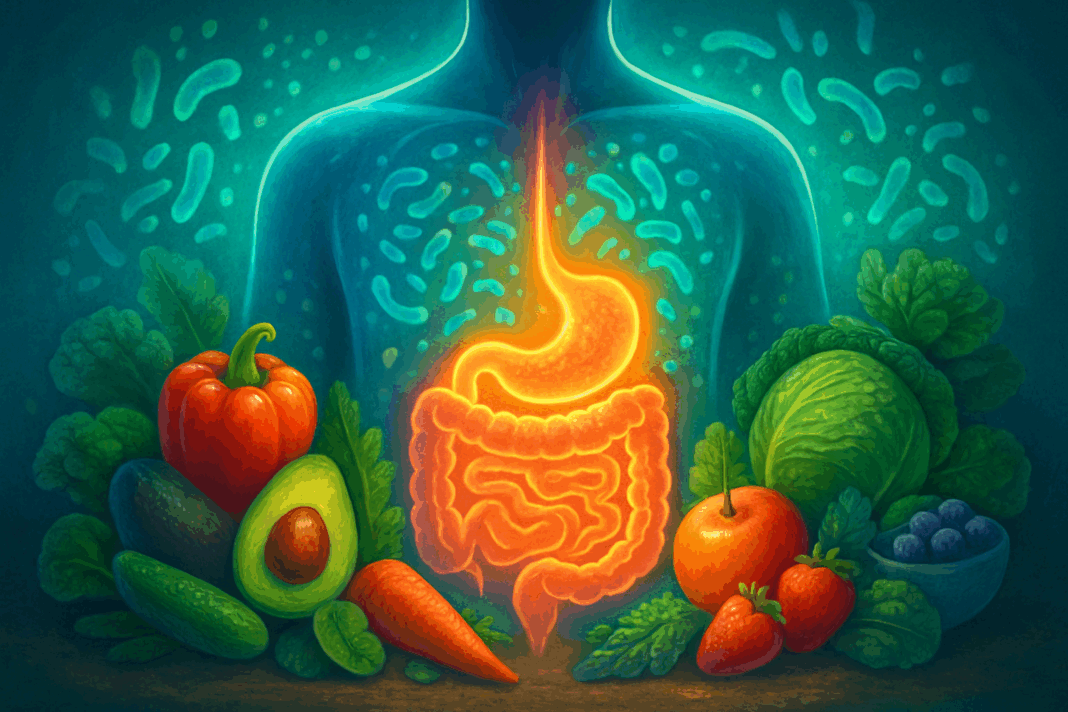Introduction: Understanding the Foundations of Digestive Wellness
Gut health is increasingly recognized as a cornerstone of overall well-being, affecting not just digestion but also immune function, mental clarity, and energy levels. The foods we eat play an instrumental role in nurturing or damaging the delicate balance of microorganisms residing in our gastrointestinal system. Among the many discussions surrounding dietary choices, identifying the worst foods for gut health has emerged as an urgent priority for individuals striving to enhance their digestive wellness. This article will deeply explore the seven critical worst offenders that compromise gut integrity, hinder microbial diversity, and contribute to a host of digestive challenges.
You may also like: The Ultimate Guide to Gut Healthy Meals: Best Meals for Gut Health and Nourishing Recipes You’ll Love
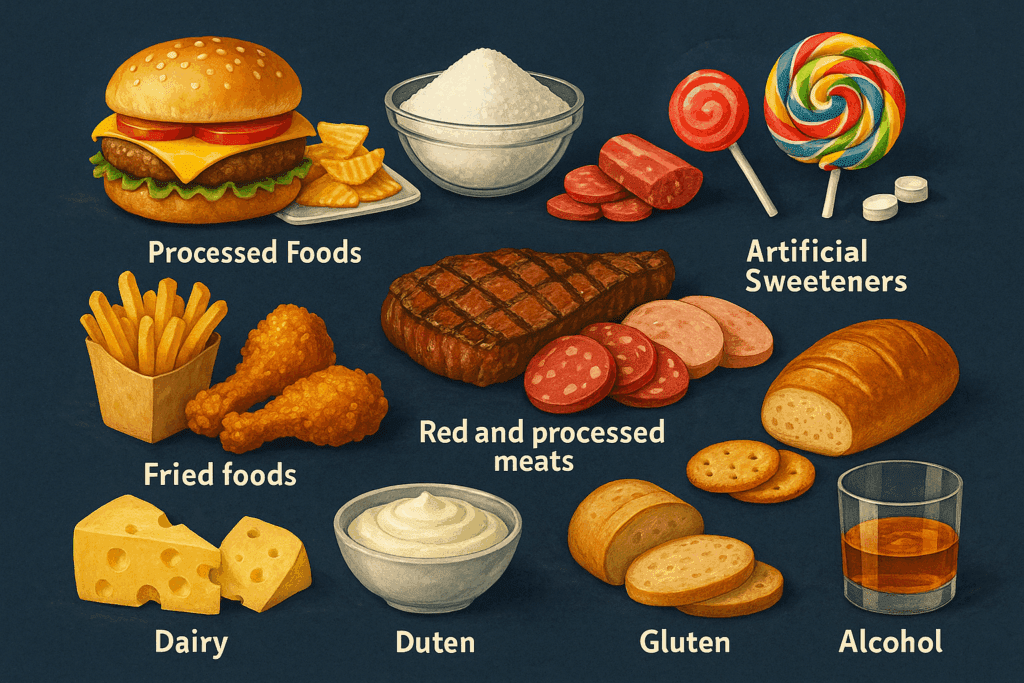
Why Gut Health Matters More Than You Think
The gut is often referred to as the body’s “second brain,” due to its profound influence on mental and physical health. A healthy gut is home to trillions of beneficial bacteria that aid in digesting food, synthesizing vitamins, and protecting against pathogens. Disruptions to this complex ecosystem can lead to issues ranging from irritable bowel syndrome (IBS) and inflammatory bowel disease (IBD) to mood disorders like anxiety and depression. Emerging research continues to reveal intricate connections between gut health and systemic conditions such as autoimmune diseases, obesity, and even neurodegenerative disorders. Therefore, understanding and addressing the worst foods for gut health is not merely a matter of avoiding digestive discomfort but is crucial for lifelong vitality.
Processed Foods: A Hidden Enemy to Gut Health
Processed foods, often praised for their convenience, are laden with additives, preservatives, and artificial ingredients that can wreak havoc on gut flora. These foods are typically stripped of fiber, an essential nutrient that serves as fuel for beneficial bacteria. Moreover, emulsifiers and artificial sweeteners commonly found in processed items have been shown to alter gut microbiota composition negatively. Studies indicate that chronic consumption of heavily processed foods may increase intestinal permeability, commonly known as “leaky gut,” leading to systemic inflammation. While it may be tempting to rely on ready-to-eat meals and packaged snacks in a fast-paced lifestyle, prioritizing whole, unprocessed foods is vital for sustaining a robust and resilient gut ecosystem.
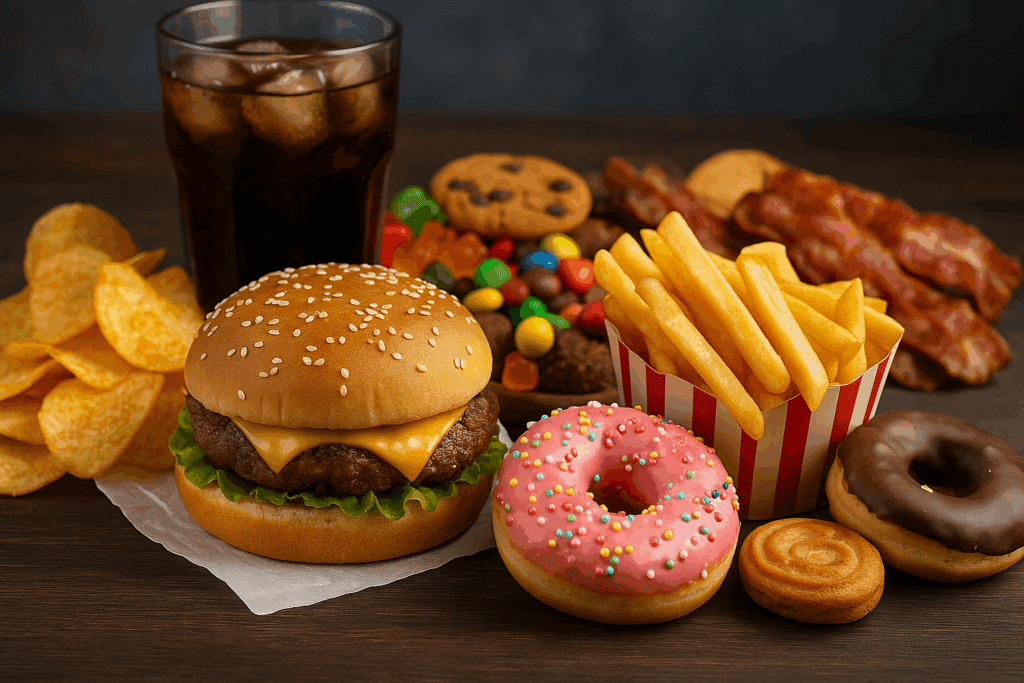
The Dangers of Excessive Sugar Consumption
Sugar, particularly refined sugars found in sweets, pastries, and sugary beverages, ranks prominently among the worst foods for gut health. High sugar intake fosters the overgrowth of harmful bacteria and yeast, such as Candida, which can crowd out beneficial microbes. This microbial imbalance, known as dysbiosis, not only impairs digestion but also weakens the immune system. Furthermore, spikes in blood glucose from sugary foods can drive inflammatory responses that extend beyond the gut, affecting metabolic and cardiovascular health. Choosing natural sweeteners like honey or maple syrup in moderation, and focusing on fruits for sweetness, supports gut health far more effectively than indulging in refined sugars.
Why Artificial Sweeteners Are No Better
In efforts to avoid sugar, many turn to artificial sweeteners like aspartame, sucralose, and saccharin. Unfortunately, these substitutes often do more harm than good when it comes to gut health. Research suggests that artificial sweeteners may alter the gut microbiome in ways that promote glucose intolerance and metabolic dysfunction. Moreover, these chemicals can disrupt the gut-brain axis, influencing appetite regulation and mood stability. While marketed as “healthier” options, artificial sweeteners deserve a place among the worst foods for gut health due to their insidious effects on microbial balance and digestive efficiency.
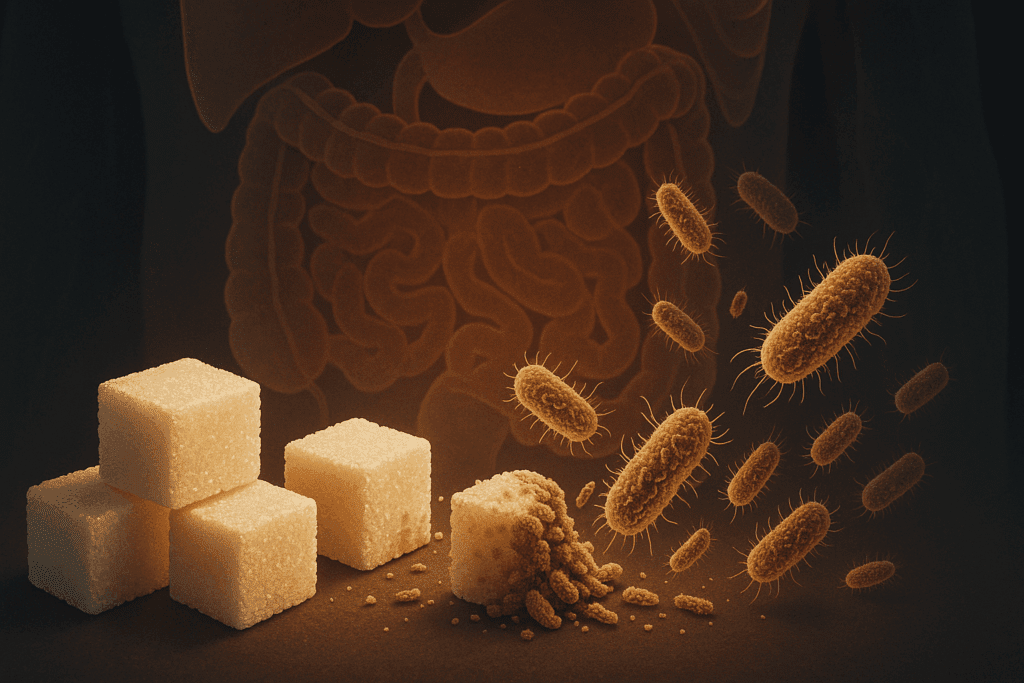
The Hidden Perils of Fried Foods
Fried foods, beloved for their crispy textures and rich flavors, are significant contributors to gut inflammation. High in unhealthy fats and often cooked in oils degraded by heat, fried items can irritate the intestinal lining and impair nutrient absorption. The oxidative stress induced by consuming rancid oils exacerbates gut permeability, enabling toxins and undigested food particles to enter the bloodstream. Such breaches in the intestinal barrier are linked to chronic inflammatory conditions and autoimmune responses. Opting for baking, grilling, or steaming instead of frying is a fundamental step toward nurturing gut integrity and promoting holistic digestive wellness.
Worst Foods for Gut Health: The Role of Red and Processed Meats
Red meats, particularly processed varieties like bacon, sausages, and deli meats, pose significant risks to gut health when consumed excessively. These meats are often high in saturated fats and preservatives such as nitrates and nitrites, which have been implicated in gut microbiome disruption and colorectal cancer risk. Additionally, digestion of red meat produces metabolites like trimethylamine N-oxide (TMAO), which have inflammatory properties detrimental to both gut and cardiovascular health. Reducing intake of red and processed meats, and opting for lean protein sources like fish, legumes, and poultry, offers a protective measure for maintaining microbial diversity and intestinal resilience.

Dairy Dilemmas: Lactose Intolerance and Beyond
While dairy products can be nutritious sources of calcium and vitamin D, they are also among the worst foods for gut health for individuals with lactose intolerance or dairy sensitivities. In such individuals, undigested lactose ferments in the colon, leading to bloating, gas, diarrhea, and discomfort. Even among those without overt lactose intolerance, excessive consumption of heavily processed dairy products like flavored yogurts and ice creams can disrupt gut balance due to added sugars and artificial additives. Choosing fermented dairy options like kefir and plain Greek yogurt, which contain beneficial probiotics, provides a gut-friendly alternative for those who tolerate them well.
The Impact of Alcohol on Gut Microbiota
Alcohol, particularly when consumed in excess, has profound negative effects on gut health. It increases intestinal permeability, promotes the overgrowth of pathogenic bacteria, and diminishes populations of beneficial microbes. These disruptions can lead to systemic inflammation, liver damage, and a weakened immune response. Moreover, alcohol metabolism generates toxic byproducts like acetaldehyde, which can further irritate and damage the gut lining. While moderate alcohol consumption may fit into a balanced lifestyle for some, those prioritizing gut health should approach alcohol cautiously and prioritize hydration and nutrient-dense foods.
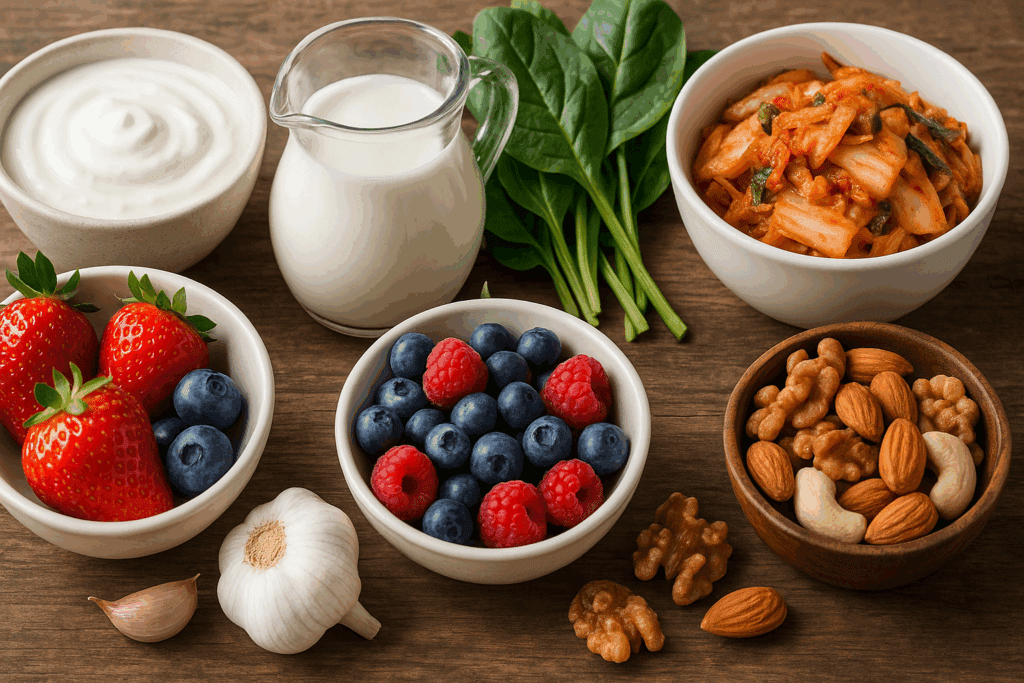
Worst Foods for Gut Health: A Deeper Look at Gluten
For individuals with celiac disease or non-celiac gluten sensitivity, gluten-containing grains like wheat, barley, and rye are among the worst foods for gut health. Gluten can trigger an immune response that damages the small intestine lining, impairing nutrient absorption and causing a range of symptoms from digestive upset to neurological issues. Even among those without diagnosed sensitivity, excessive gluten intake from heavily processed wheat products may contribute to bloating and discomfort. Opting for gluten-free whole grains like quinoa, brown rice, and buckwheat ensures nutrient intake without compromising gut integrity.
Sodium Overload: The Salty Saboteur
High-sodium diets, often a result of consuming processed and packaged foods, can adversely affect gut health by promoting inflammatory pathways and hypertension. Excess sodium intake is linked to changes in gut microbiota composition that favor the growth of pro-inflammatory bacteria. Moreover, high salt consumption can impair immune function, making the body more susceptible to infections and chronic diseases. Emphasizing fresh, unprocessed foods and seasoning meals with herbs and spices instead of excessive salt is a proactive way to protect both gut and cardiovascular health.
The Synergistic Effects of Poor Dietary Choices
It is important to recognize that the damage to gut health often results not from a single food choice but from cumulative dietary patterns. When processed foods, excessive sugars, fried foods, and other harmful dietary elements converge, they create a synergistic effect that overwhelms the gut’s natural defenses. This cumulative assault can erode microbial diversity, impair the gut barrier, and ignite systemic inflammation, setting the stage for a cascade of chronic health issues. Therefore, addressing the worst foods for gut health involves a comprehensive reevaluation of daily dietary habits and a commitment to sustained, mindful eating.
Strategies for Healing and Protecting Your Gut
Recovering from the damage inflicted by the worst foods for gut health requires intentional and sustained efforts. Incorporating fiber-rich fruits, vegetables, legumes, and whole grains helps nourish beneficial microbes and restore microbial balance. Fermented foods like sauerkraut, kimchi, and kombucha introduce probiotics that support gut resilience. Additionally, prebiotic-rich foods such as garlic, onions, and asparagus serve as fuel for healthy bacteria. Stress management, regular exercise, and sufficient sleep also play critical roles in maintaining gut health by regulating inflammatory responses and supporting microbial diversity.

Mindful Eating Practices to Enhance Gut Health
Beyond food choices alone, how we eat profoundly impacts digestive health. Mindful eating, characterized by paying full attention to the eating experience, enhances digestion and nutrient absorption. Chewing food thoroughly, eating without distractions, and savoring meals can optimize enzymatic breakdown and reduce the likelihood of gastrointestinal distress. Moreover, listening to hunger and satiety cues prevents overeating, which can burden the digestive system. Cultivating a mindful eating practice transforms meals into opportunities for nourishing both body and mind.
The Role of Holistic Supplements in Gut Health
While diet forms the foundation of gut health, holistic supplements can offer valuable support during times of imbalance or recovery. Probiotic supplements, containing strains like Lactobacillus and Bifidobacterium, can help reestablish healthy microbial populations. Prebiotic supplements, often derived from fibers like inulin, promote the growth of beneficial bacteria. Digestive enzymes may aid individuals struggling with food intolerances by enhancing nutrient breakdown and absorption. However, it is crucial to select high-quality supplements verified for potency and purity and to consult healthcare providers before beginning any supplementation regimen.
Frequently Asked Questions (FAQ) About the Worst Foods for Gut Health
How do processed foods harm the gut microbiome beyond just nutrient loss? Processed foods contribute to gut microbiome disruption in multiple ways beyond simply lacking nutrients. Many contain additives like emulsifiers and preservatives, which have been shown to thin the protective mucus layer in the intestines. This weakening of gut barriers can increase susceptibility to pathogens and inflammation. Furthermore, processed foods typically lack the diverse fibers needed to sustain a healthy gut ecosystem, leading to a significant reduction in beneficial bacterial species. Over time, this microbial imbalance may result in systemic effects, including compromised immune responses and heightened risks for chronic diseases.
What are emerging insights into how sugar impacts gut-brain communication? Recent studies suggest that excessive sugar consumption can impair the gut-brain axis, the bi-directional communication network linking gut microbes and the central nervous system. High-sugar diets may favor the growth of pro-inflammatory microbes, which produce metabolites that interfere with neurotransmitter production, including serotonin and dopamine. Disrupted gut-brain signaling has been associated with mood disorders, cognitive decline, and stress regulation issues. This illustrates that the dangers of sugar extend far beyond metabolic diseases, subtly influencing mental health through gut microbiome alterations. These insights urge a more cautious and comprehensive view of sugar’s role in daily dietary choices.
Why are fried foods particularly problematic for gut health? Fried foods pose a unique threat to gut health due to their high levels of advanced glycation end products (AGEs), compounds formed during high-temperature cooking processes. AGEs promote oxidative stress and inflammation, both of which disrupt the integrity of the gut lining. Additionally, the degraded oils used in frying often harbor toxic lipid oxidation products that further irritate intestinal tissues. The frequent consumption of fried foods can exacerbate gut permeability issues, popularly known as “leaky gut,” increasing the likelihood of immune system overactivation. Therefore, minimizing fried food intake is crucial for those seeking to protect and repair their gut ecosystems.
What role do emulsifiers in processed foods play in gut inflammation? Emulsifiers, commonly found in salad dressings, ice creams, and processed sauces, have increasingly been implicated in gut health disorders. Research has shown that emulsifiers such as polysorbate 80 and carboxymethylcellulose can alter the composition and localization of gut bacteria, making them more prone to infiltrating the mucosal layer. This penetration triggers low-grade inflammation and sets the stage for metabolic syndrome and inflammatory bowel disease. Emulsifiers effectively blur the critical boundary between gut microbes and intestinal tissues, leading to long-term consequences that remain under-recognized in mainstream dietary advice. Reducing emulsifier intake can be a subtle but impactful strategy for promoting digestive resilience.
How do the 7 worst foods for gut health influence long-term disease risk? The 7 worst foods for gut health—including processed foods, excessive sugars, fried foods, red and processed meats, problematic dairy, alcohol, and gluten-heavy products—contribute to cumulative gut barrier damage and microbial dysbiosis. Over time, this can trigger systemic inflammation that acts as a precursor to numerous chronic diseases, including type 2 diabetes, autoimmune disorders, and even certain cancers. Altered gut microbiota from poor dietary patterns have also been linked to neurodegenerative diseases like Alzheimer’s. Thus, focusing on eliminating these worst foods for gut health is not simply about achieving better digestion but plays a vital role in long-term preventive medicine. Early dietary interventions can radically shift one’s health trajectory toward resilience rather than disease.
Can occasional consumption of the worst foods for gut health still cause harm? While the occasional indulgence in the worst foods for gut health may not immediately lead to noticeable symptoms, repeated exposures—even if infrequent—can have a cumulative impact. Gut bacteria are highly sensitive to dietary shifts, and even occasional bouts of processed or fried foods can tip the microbial balance toward harmful species. Recovery from these disruptions can take time, depending on the individual’s baseline gut health and resilience. Over months and years, seemingly minor exposures can escalate into chronic inflammation or weakened immunity. Therefore, even sporadic consumption should be approached with mindfulness, and efforts should be made to prioritize gut-supportive foods consistently.
What are advanced strategies to rebuild gut health after exposure to harmful foods? Beyond simply eliminating the worst foods for gut health, advanced recovery strategies include implementing targeted prebiotic and probiotic therapies. Polyphenol-rich foods, such as berries, green tea, and dark chocolate, have been shown to nourish beneficial bacteria and counteract inflammatory processes. Incorporating resistant starches—found in foods like cooked and cooled potatoes—can promote the growth of key microbial species linked to gut integrity. Additionally, personalized microbiome testing can provide insight into specific imbalances, allowing for tailored interventions. A comprehensive approach not only involves dietary adjustments but also lifestyle factors like stress reduction, improved sleep hygiene, and regular physical activity.
How can social eating habits contribute to the consumption of the worst foods for gut health? Social contexts often normalize and encourage the consumption of processed, sugary, and fried foods, inadvertently exposing individuals to the worst foods for gut health. Gatherings like parties, holidays, and corporate events frequently center around such items, making it challenging to maintain a gut-friendly diet. Peer pressure and social bonding through food can override individual health priorities, leading to habitual indulgence. Recognizing these social dynamics empowers individuals to make proactive choices, such as bringing healthier alternatives to gatherings or eating a gut-supportive meal beforehand. Building a supportive network that shares health values can greatly aid in maintaining gut wellness over the long term.
Is there a link between early childhood diet and sensitivity to the 7 worst foods for gut health later in life? Emerging research suggests that early childhood diet profoundly shapes gut microbiota development and long-term sensitivity to dietary insults. Children exposed to high levels of processed foods, sugar, and artificial additives are more likely to develop imbalanced gut ecosystems, predisposing them to inflammatory reactions from the 7 worst foods for gut health in adulthood. Furthermore, early microbial diversity—or lack thereof—can influence immune system calibration, affecting susceptibility to food sensitivities and chronic diseases. Parents and caregivers play a crucial role in establishing dietary patterns that encourage robust gut health from a young age. Proactive attention to early diet lays the groundwork for resilience against dietary challenges later in life.
What emerging research areas are exploring new solutions to counteract the effects of the worst foods for gut health? Scientific exploration into postbiotics—metabolic byproducts of beneficial bacteria—is gaining momentum as a promising approach to repairing gut damage inflicted by poor diet. Unlike probiotics, postbiotics offer direct anti-inflammatory and gut-barrier-strengthening benefits without relying on bacterial colonization. Another burgeoning field involves personalized nutrition algorithms that adjust recommendations based on individual microbiome profiles, enhancing resilience against the 7 worst foods for gut health. Advances in bioengineering are also looking into designer probiotics tailored to outcompete pathogenic microbes selectively. These innovations represent the future frontier of gut health, offering hope for more targeted and effective interventions beyond traditional dietary advice.
Conclusion: Embracing a Gut-Healthy Lifestyle for Lifelong Vitality
Recognizing and avoiding the worst foods for gut health is an empowering step toward cultivating a resilient digestive system and achieving optimal well-being. Processed foods, excessive sugars, artificial sweeteners, fried foods, red and processed meats, problematic dairy products, and excessive alcohol are critical offenders that undermine gut integrity. By understanding their detrimental impacts and making informed, nourishing choices, individuals can foster microbial diversity, strengthen the gut barrier, and protect against chronic disease. Embracing a gut-healthy lifestyle is not merely a diet but a lifelong commitment to honoring the intricate symphony of life that thrives within us. With each mindful meal and conscious choice, we lay the foundation for enduring health, vitality, and harmony.
Further Reading:
What are the worst foods for gut health?

